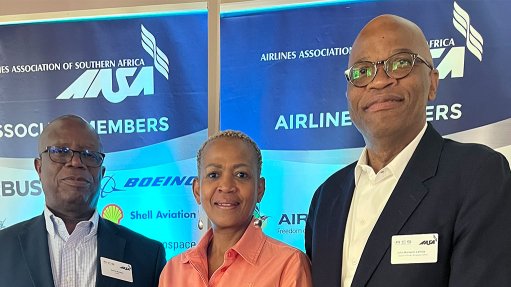
Left to Right: AASA CEO Aaron Munetsi, AASA chairperson Lulu Rasebotsa, and AASA deputy chairperson Prof John Lamola
Photo by: AASA
The Airlines Association of Southern Africa (AASA) has announced the names of its latest chairperson and deputy chairperson, who were elected at its recent AGM. They will serve for the next 12 months.
The chairperson for the 2024/25 period was technically re-elected, as she already held the post. She is Lula Rasebotsa, GM of Air Botswana.
The newly elected deputy chairperson is Professor John Lamola. He is interim CEO of South African Airways.
“Lulu and John will provide guidance and support to AASA in our ongoing engagements with governments, tariff, licensing and safety regulators, airport operators, air navigation service providers and other role players in our advocacy work,” stated AASA CEO Aaron Munetsi. “Our goal is that policy, regulations and standards promote competitive, affordable, economically and environmentally sustainable, secure and safe air transport with comprehensive intra-African connectivity.”
The AASA AGM was held in Paarl, near Cape Town and was hosted by FlySafair. More than 200 delegates took part. They represented airlines and other aviation stakeholders, including airports, airframe and engine manufacturers, air navigation service and weather services providers, and industry suppliers.
AASA was founded in 1970. It has 17 airline members, representing most of the airlines based in the Southern African Development Community, and 40 associate members. The associate members comprise aircraft manufacturers, engine manufacturers, ground handling companies, infrastructure service providers, other industry suppliers, and allied industry bodies. It acts on its members' airlines behalf in matters of common interest, such as government policies, legislation, regulations, planning, taxes and charges, as well as safety, security and operational efficiency, among other things. ![]()